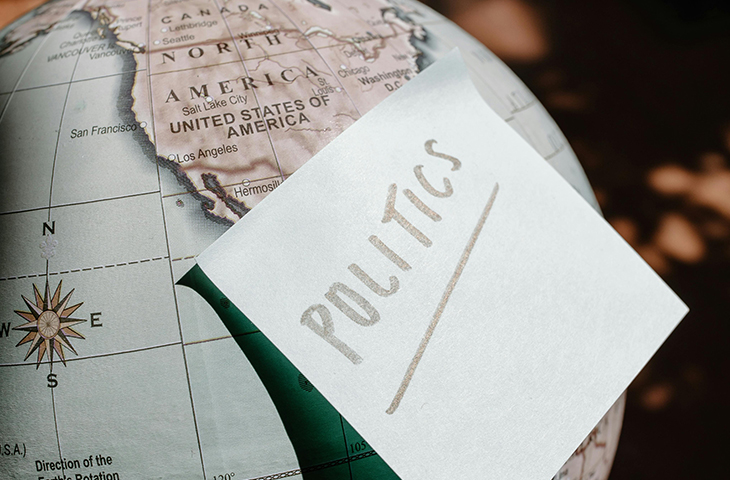The Odd Couples Of Trump’s Washington

This Valentine’s Day, Trumpworld seems on the verge of a messy breakup — or, more likely, many of them.
In January, everyone was in a celebratory mood during Inauguration festivities, from RFK Jr.’s MAHAmoms to New Right “cruel kids” to the whole extended Trump clan, exes and all. All the Instagrams and unbanned TikToks underscored a cohesive lovefest, papering over conflicts of bygone eras. But just beneath the surface, trouble was already brewing: Within just a couple of weeks of Trump’s election win, Vivek Ramaswamy, former co-chief of the Department of Government Efficiency, was out, exiled after he went on a rant on X about the need for high-skilled immigrants, inflaming a very different part of Trump’s base that Ramaswamy had little connection to.
That clash, though, was just a preview. Very public Inauguration merry-making aside, the MAGA coalition has long been a rickety hodgepodge of groups with views that often don’t fit neatly into any partisan or ideological box. Its members, as a result, frequently clash with each other. (Remember Steve Bannon vs. Javanka from Trump’s first administration, or Reince Priebus vs. Anthony Scaramucci?) That fighting doesn’t stop with just Trump’s inner circle and Cabinet members; Trump’s ascent and his, ahem, unique governing style has also pitted Republicans in Congress and the rest of Washington against each other. And then there are the people who just don’t like each other, for all the normal venal and trifling reasons that arise when two combative personalities are in the same room. Already, Bannon is waging war on Elon Musk, and the Treasury secretary and likely Commerce secretary have to get past a very rocky start to work together.
We at POLITICO Magazine decided to celebrate Hallmark’s favorite holiday with a twist: figuring out which pairs of people are most likely headed for an ugly split sometime soon. Call them rivalries to watch, forced marriages — or, as we have, odd couples — these are pairs of people who are going to be forced to find common ground with bitter ideological or just plain old personal enemies in Trump’s Washington — and who could be headed for some major blow ups.
This breakup has begun already, but the worst is yet to come. Steve Bannon, a key architect of Trump’s 2016 win and a former adviser to the president, has helped shape the nationalist-populist, anti-immigration core of MAGA more than any other person in Trump’s orbit. In other circumstances, the two men would be working together to shore up two very different but crucial parts of Trump’s base. But that is not what has happened. Fresh out of prison in the fall, and apparently observing just how much power Elon Musk had amassed in his absence, Bannon went to war with Trump’s DOGE attack dog. In early January, Bannon warned Musk that he, as a “convert” to MAGA, needed to sit back and study rather than take over, or “we’re going to rip your face off.” Bannon clearly doesn’t think Musk has listened to that warning. In an interview withCorriere della Sera later that month, Bannon called Musk “truly evil” and said that he would have him kicked out by Inauguration. So far, Musk is still in. “Bannon is a great talker, but not a great doer,” Musk posted on X in February. “What did he get done this week? Nothing.”
It’s not always ideological differences. Trump’s reluctance to play referee between competing factions also extends to legislative strategy, which has already caused a split between House Speaker Mike Johnson and Senate Majority Leader John Thune. They both are known to be polite and men of faith, but Trump might force them to set aside their church manners. Johnson and Thune have already tussled over how they will pass the first big-ticket agenda items of the Trump administration. Thune has pushed for a two-bill approach that would separate border, energy and defense items from a second, more complex tax-focused bill that would be passed later. Johnson wants to pass it all in what he and Trump have called “one big, beautiful bill.” But Thune thinks Johnson has little chance of passing a bill with so many potentially polarizing items. That clash has reportedly led to other gripes between the two men, shedding light on another key dividing line between the two kinds of Republicans in the Trump era: those who, like Thune, have worked their way up by building relationships with colleagues over decades and those who, like Johnson, have ridden Trump’s good graces to the top.
Commerce nominee Howard Lutnick actually wanted another job that ultimately went to investor and hedge fund manager Scott Bessent: Treasury secretary. Lutnick aggressively promoted himself for the role behind the scenes and reportedly took aim at Bessent specifically. Lutnick lobbied Trump allies, including Musk and RFK Jr., to make a case for him to Trump, while he spread the word about Bessent’s late conversion to MAGA economics and his earlier affiliation with George Soros (Bessent worked for Soros earlier in his career). It all culminated in a phone call where, according to a source who spoke with FoxBusiness, Bessent told Lutnick he was aware of his efforts to undermine him and that Lutnick could “go fuck” himself. Now, the two will likely be working together on a number of Trump directives, such as the recent creation of a government-owned investment fund, which the president asked Bessent and Lutnick to take the lead on. Hopefully they can move past their differences, but that is not at all how the Trump White House usually works.
Some odd bedfellows might already have irreconcilable differences. Michael Anton, a former national security official in the first Trump administration, reportedly withdrew his name from contention for deputy national security adviser when he learned Sebastian Gorka was Trump’s pick for deputy assistant and senior director for counterterrorism in late 2024. The two men have a beef stretching back to the first Trump administration, at least according to Anton, who wrote about their bad blood in a Claremont Institute publication in 2023. Anton wrote that it all started when Gorka, then a deputy assistant to the president, was irritating senior White House staff by claiming he authored a Trump speech in 2017, a claim that Anton had to correct as National Security Council communications director at the time. A year later, still according to Anton’s written account, Gorka and Anton came face to face in a Fox News green room, where Gorka blew up at Anton, yelling, “No, I’m not gonna shake your hand! How dare you try to shake my hand!” Anton was recently named director of policy planning in the State Department, where he won’t be working with Gorka quite as closely as he would have been as deputy national security adviser, but the two may still overlap when it comes to counterterrorism or related issues.
Before Trump picked her to lead the Department of Agriculture, Brooke Rollins was president and CEO of the America First Policy Institute, the pro-Trump think tank that she co-founded in 2021. That institute was widely seen as a link between Trump and the establishment GOP faction dedicated to preserving the party’s pro-business, free-trade orthodoxy. With her nomination as USDA chief, then, she is poised to butt heads with RFK Jr. and the coalition he has brought into the MAGA tent. Many of RFK Jr.’s allies in the pro-food-reform Make America Healthy Again (MAHA) tent are already eyeing Rollins warily over her support for Big Ag stances, such as forcing states to allow the sale of pork from crated pigs, which some states have banned. Rollins’ right-hand woman will be the recently named USDA chief of staff, Kailee Tkacz Buller, who has a long industry lobbying background, most recently as chief of the National Oilseed Processors Association — yes, seed oils, the sworn enemy of crunchy-con health and masculinity influencers such as Tucker Carlson, Joe Rogan and Kennedy himself. The MAHA faithful took note.
In late December, Trump named venture capitalist Sriram Krishnan to be his AI adviser. Krishnan had recently made a post urging Elon Musk to “remove country caps for green cards / unlock skilled immigration,” and his appointment triggered a war between those in Trump’s base who oppose all kinds of immigration and those more aligned with the GOP’s business wing who would like to ease restrictions on high-skilled immigrants — such as those in the United States on H1-B visas. Krishnan is working on AI policy, not immigration, but there may well be overlap, since many tech companies rely on high-skilled immigrant labor. That could put him at odds with Stephen Miller, a longtime Trump adviser on immigration who once got so emotional about H-1B visas in a conversation with a reporter that he wept. This particular difference-of-opinion might end up in a reconciliation rather than breakup, though; some recent reporting suggests that Miller might follow Trump’s lead as the latter warms to H-1B visas.
John Ratcliffe, a former GOP lawmaker and director of national intelligence during Trump’s first term, was confirmed as CIA chief in January. During his confirmation hearing, he spoke up in strong support for Section 702 of the Foreign Intelligence Surveillance Act (FISA), which allows the U.S. government to engage in warrantless surveillance of non-Americans outside the United States. (In doing so, U.S. agencies also often collect information of Americans who are in contact with the targeted foreigners.) In 2020, Tulsi Gabbard, Trump’s new director of national intelligence but who was then a Democratic member of Congress, introduced legislation to repeal that section of FISA. She has also defended Edward Snowden, the former contractor who leaked information about the program and was charged with espionage. Gabbard, though, defended the tool as “crucial” and told Punchbowl News in a statement before her confirmationhearing that she would uphold it. Some senators weren’t buying her change of heart, but whether she supports it or not, Gabbard will likely use some of the intelligence gathered under FISA when she asks for Ratcliffe’s help putting together the President’s Daily Brief.
Trump tapped Andrew Ferguson to lead the Federal Trade Commission, making him the top antitrust enforcer in the country — a move that came after his pledge to Trump’s transition team to make the government less oppositional to corporate mergers and end efforts to regulate artificial intelligence. That might drive a wedge between Ferguson and another key antitrust enforcer in the government, Gail Slater, who was nominated by Trump to lead the antitrust division at the Department of Justice. (Slater needs to be confirmed first, but Ferguson does not.) Many on the left have anticipated that Slater, a former staffer in Vice President JD Vance’s Senate office, will take on “Big Tech” solely to do Trump’s bidding, but those who know Slater well aren’t as sure. Former colleagues expect her to go after tech companies from a traditional antitrust framing rather than targeting social media companies for Trump’s personal vendettas. Ferguson, though, hasn’t been shy about channeling Trump on that matter: He has vowed to go after social media sites that censor conservativevoices, a yearslong peeve of Trump. Slater is one of the less well-known figures on this list, and it’s unclear exactly how or whether a clash between these two will play out, but they represent two very different understandings of antitrust enforcement in the Trump era, and only one — if either — can win out.
For now, this has been a perfect match. “I love @realDonaldTrump as much as a straight man can love another man,” Musk posted on X last week, while on Tuesday Trump signed another executive order to give Musk even greater authority at DOGE. But people who are paid to pay attention to these kinds of relationships — Washington reporters, mostly — have been betting for months that this pair is due for an explosive split. “The Trump Show is a one-man play,” POLITICO senior political columnist Jonathan Martin wrote in early February, “and there’s not room for anybody else, least of all somebody wealthier and with a (nearly) comparable thirst for attention.” It may seem to be only a matter of time with those two, but the Trump White House always finds a way to shock. Perhaps the biggest surprise of all will be a happy ending for the perfectly matched — if also extremely combustible — pair.


